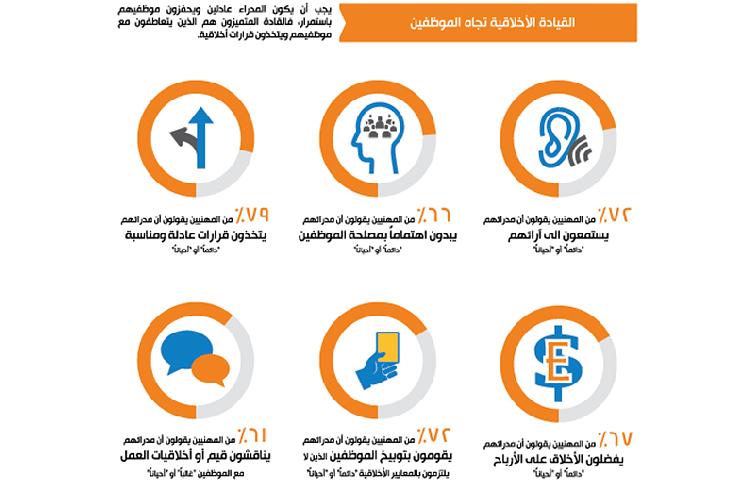
64% of MENA Respondents Believe That Ethics is the Collective Responsibility of All Employees in a Company
Given the importance of ethics in the corporate world, Bayt.com has recently conducted a poll, in partnership with the Canadian University Dubai (CUD), to ascertain the role that business leaders play in encouraging ethical conduct in the Middle East and North Africa (MENA) region. The poll, entitled ‘Ethical Leadership: Views from the MENA region’, has revealed that the majority (64%) of respondents believe that all employees have a responsibility to be ethical in business, with 20% holding the company responsible for establishing a strong code of conduct.
Research has demonstrated the importance that a leader plays in setting the right example, creating an environment that encourages good corporate citizenship, and in motivating employees to perform better and more innovatively. This poll takes a look at a distinct type of leadership – ethical leadership – where leaders are both moral people and moral managers.
When asked to define what business ethics meant to them, almost half of the surveyed respondents (47%) held a legalistic view, i.e. conducting business according to the legal requirements and not breaking laws, while 37% related it to being socially responsible.
The decision-making process
To gauge whether managers in the MENA engage in ethical decision-making processes, the poll asked respondents whether their managers make fair and balanced decisions. 43% of poll respondents said ‘sometimes’, while more than a third (36%) think their managers are ‘usually’ fair in their decision-making processes.
Based on the poll results, the majority of managers in the MENA region are not of the view that the ends justify the means. In fact, almost 6 in every 10 respondents (58%) agree that their managers define success not just by results, but also by the way results are obtained.
However, managers appear to focus primarily on profits; 38% of respondents said that their managers prioritize ethics over profits ’to a large extent’, while 28% said ’occasionally’.
According to the poll, less than half (45%) of respondents reported that their supervisors ’often’ consider the right thing to do when making decisions, 38% said ’sometimes’, while the remaining 17% stated that it was either ‘rarely’ or ‘never’ to have the right thing considered by their managers.
Ethics outside the workplace
When asked whether their managers conduct themselves in an appropriate manner outside the workplace, 39% of respondents said ‘yes, most of the time’. A majority of poll respondents felt that their managers had their best interests in mind at least ‘some of the time’ (27%) or to ‘a large extent’ (39%). On the other hand, a third felt that their managers did not care about their best interests with 21.5% stating that their managers ‘never’ had their best interests in mind and 12.5% responding ‘rarely’.
On a positive note, 70.5% of respondents confirmed that their managers listen to them, with 38.5% saying they listen ‘to a large extent’. However, almost a third (29.5%) hardly ever have the opportunity to be heard by their managers.
Leaders lead by example
When employees were asked if their managers set an example of how to do things ethically, almost half (45%) of the respondents conveyed that managers are ‘often’ good role models in displaying ethical behavior, with the other half split between only doing so ’sometimes’(29%), ‘rarely’ (14%) or ‘never’ (12%). According to the poll, 62% of managers discuss business ethics and values with their employees, with 28% discussing them ‘often’.
Moreover, disciplinary procedures when employees breach ethics standards do exist. In fact, 72% of respondents say that their managers discipline or reprimand employees for violating ethics standards; of these, 28% do so occasionally.
When asked whether they consider their manager to be an ethical leader, close to half (46%) said ‘yes, to a large extent’, while a quarter thought so, but only ‘some of the time’.
“Our mission at Bayt.com is to empower people by giving them access to information that is accurate and well-researched. In terms of ethical leadership, we can conclude that managers set the tone for how the entire company runs on a day-to-day basis. When the prevailing management philosophy is based on ethical practices and behavior, leaders within an organization can direct employees by example and guide them in making decisions that are not only profitable, but also ethical,” said Suhail Masri, VP - Employer Solutions, Bayt.com. “It is important to recognize that being ethical is not just about doing what is required by law, but living by moral values in both your personal and professional life.”
Jeanette Teh, Assistant Professor, Canadian University Dubai, said: “In general, the poll results indicate an awareness of the importance of ethics in business by the respondents and their managers although there is room for improvement in certain aspects. More specifically, there needs to be more explicit training and communication about ethical issues and in the decision-making processes of managers to ensure more emphasis on ethical principles over profit.”
Data for the Bayt.com ‘Ethical Leadership: Views from the MENA region’ poll was collected using modified questions from Professors Michael Brown, Linda Trevino, and David Harrison’s Ethical Leadership Scale. The poll was conducted between 18 September and 14 October 2015 with respondents from Algeria, Bahrain, Egypt, Iraq, Jordan, Kuwait, Lebanon, Libya, Saudi Arabia, Morocco, Oman, Qatar, Tunisia, the UAE, and Yemen.

























